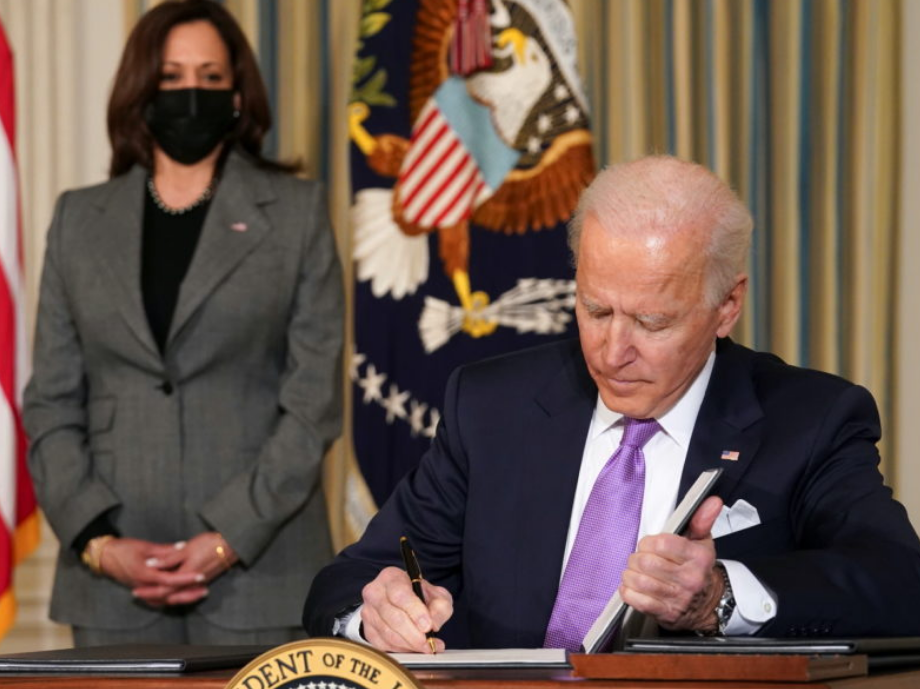
- Details
- By Darren Thompson
Washington — President Biden signed a series of executive orders on Wednesday aimed at addressing climate change, continuing to set the tone for the new administration that was applauded by both conservationists and tribes alike.
The Executive Order on Tackling the Climate Crisis at Home and Abroad, in essence, is President Biden’s commitment to protect the country’s air, water, and communities. The order aims to conserve 30 percent of the country's lands and waters in the next 10 years, double the nation's offshore wind energy, and move to an all-electric federal vehicle fleet and other changes.
According to the U.S. Energy Information Administration, 61 percent of the nation's electric power comes from natural gas and coal, 20 percent from nuclear and 17 percent from wind, solar and other renewable energy.
“This is the single biggest day for climate action in more than a decade, and what makes it all the better is that President Biden and Vice President Harris are just getting started,” said League of Conservation Voters (LCV) President Gene Karpinski in a press release. “We’re thrilled that this administration is taking a whole of government approach that puts bold climate action, clean energy, and environmental justice at the heart of their domestic and foreign policy agenda.”
What that looks like for Tribes varies, but it is welcomed.
“Renewable energy projects like Anpetu Wi wind project could benefit from more opportunities that support alternative energy producing projects,” said Anpetu Wi General Manager Joseph McNeil to Native News Online.
“The same opportunities for utility infrastructure acquisition funding to create and sustain local renewable energy projects for the future as existing power authorities have benefitted from government subsidies, and Native Nations should be provided the same opportunities,” said McNeil.
Anpetu Wi is the Standing Rock Sioux Tribe’s 235 megawatt wind farm that is currently in progress, and which will provide clean energy and a foundation for ongoing economic development to the people of Standing Rock. It is the tribe’s commitment to land, water, and people to transition from fossil fuel dependence and exploitation to self-determination and sustainability.
Many believe, including LCV Board Chair and former EPA administrator Carol M. Browner, that President Biden is implementing a climate policy course based on science and grounded in equity and justice. “President Joe Biden is taking unprecedented actions and sending an unmistakable message to the world that the United States is back and serious about tackling the climate crisis,” she said in a press release.
While the President is implementing new orders, tribes are exempt from some of them, including the temporary suspension of U.S. oil and gas leasing and permitting on federal lands. However, Native News Online reported Wednesday that Biden is reaffirming President Bill Clinton’s Executive Order 13175, which encouraged government-to-government relations with tribes.
“It is very encouraging to read the directive from President Biden in reference to E.O. 13175,” said McNeal, Standing Rock Sioux Tribal member and former Tribal Council member. “It reignites the effort started more than 20 years ago and we hope to see some real changes when consulting with tribes.”
Biden’s climate change plan is calculated at $2 trillion; while campaigning, Biden had promised to overhaul tax breaks to oil companies — worth billions of dollars to the oil, coal and gas industries. The plan is expected to face fierce opposition in Congress.
More Stories Like This
Native News Weekly (August 25, 2024): D.C. BriefsNavajo Nation Mourns the Passing of Former Vice President Rex Lee Jim
Deb Haaland Earns Endorsement From Communications Workers of America Local 7076
University Soccer Standout Leads by Example
Two Native Americans Named to Democratic Congressional Campaign Committee's“Red to Blue” Program
Help us defend tribal sovereignty.
At Native News Online, our mission is rooted in telling the stories that strengthen sovereignty and uplift Indigenous voices — not just at year’s end, but every single day.
Because of your generosity last year, we were able to keep our reporters on the ground in tribal communities, at national gatherings and in the halls of Congress — covering the issues that matter most to Indian Country: sovereignty, culture, education, health and economic opportunity.
That support sustained us through a tough year in 2025. Now, as we look to the year ahead, we need your help right now to ensure warrior journalism remains strong — reporting that defends tribal sovereignty, amplifies Native truth, and holds power accountable.
 The stakes couldn't be higher. Your support keeps Native voices heard, Native stories told and Native sovereignty defended.
The stakes couldn't be higher. Your support keeps Native voices heard, Native stories told and Native sovereignty defended.
Stand with Warrior Journalism today.
Levi Rickert (Potawatomi), Editor & Publisher
